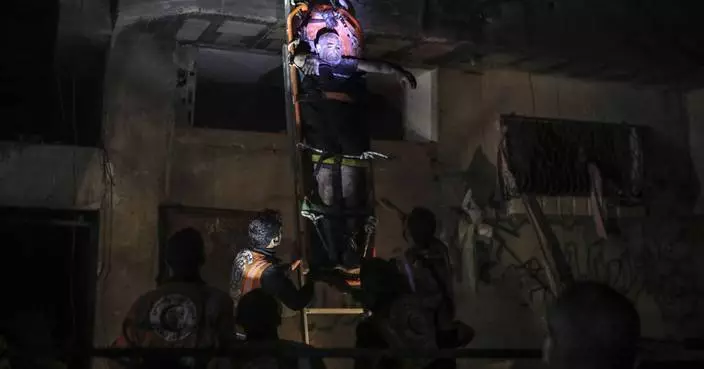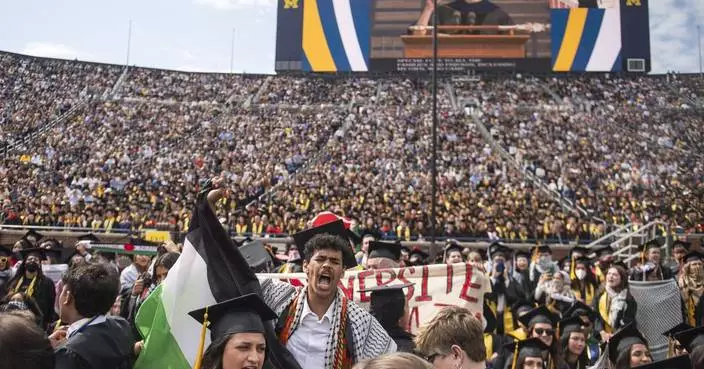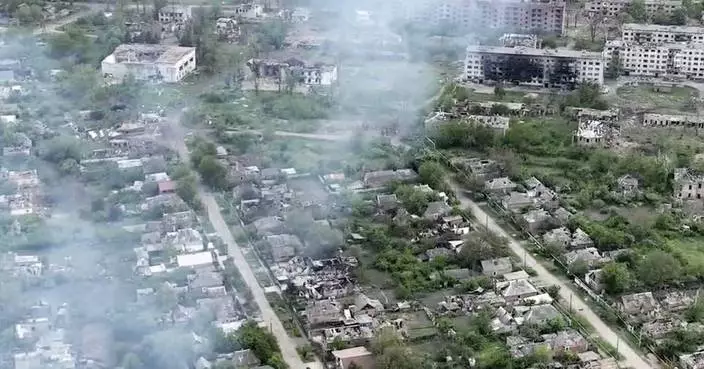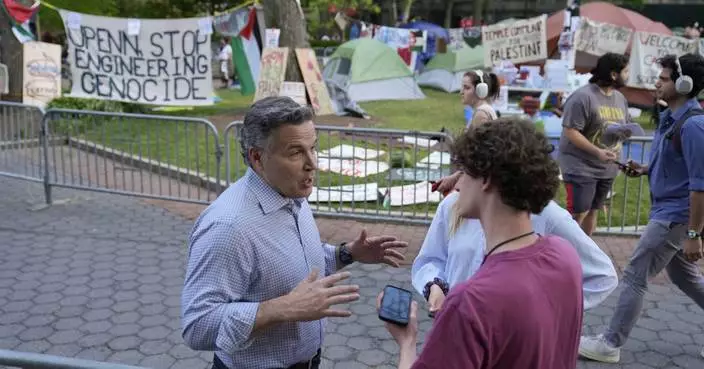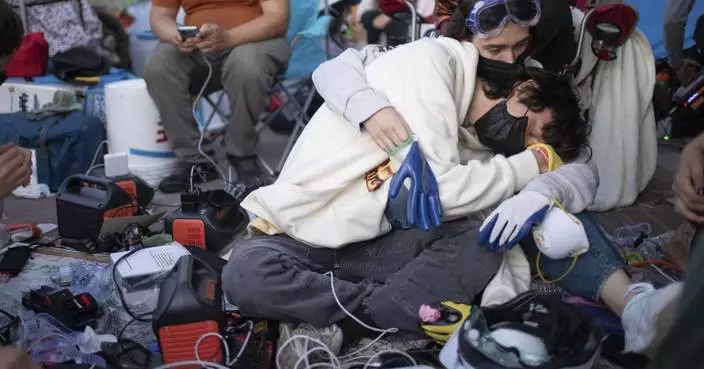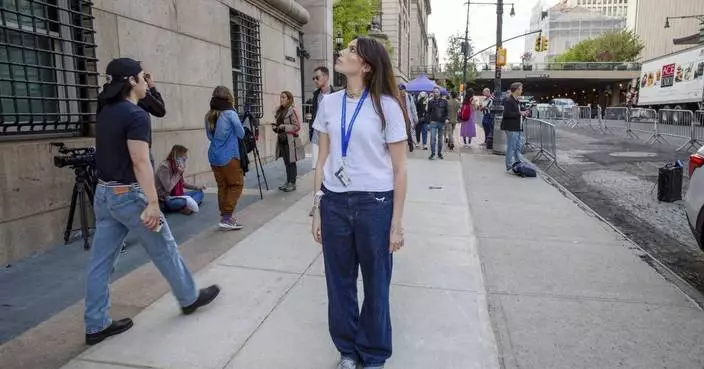The Western airstrikes targeting suspected Syrian chemical weapons facilities might have rained down punishment from the sky, but they will not fundamentally degrade a war machine whose main bases, weaponry and personnel remain in place.
As a symbol, they might reflect the inability to prevent President Bashar Assad from marching toward a professed victory in the civil war — still denying he ever even used banned substances, and perhaps not even needing them.
Click to Gallery
The Western airstrikes targeting suspected Syrian chemical weapons facilities might have rained down punishment from the sky, but they will not fundamentally degrade a war machine whose main bases, weaponry and personnel remain in place.
Firefighrers extinguish smoke that rises from the damage of the Syrian Scientific Research Center which was attacked by U.S., British and French military strikes to punish President Bashar Assad for suspected chemical attack against civilians, in Barzeh, near Damascus, Syria, Saturday, April 14, 2018. (AP Photo/Hassan Ammar)
Any opposition expectations that the airstrikes might try to destroy or degrade Assad's lethal air power or target bases where his warplanes and helicopters begin their bombing missions were quickly dashed: The U.S., British and French precision attacks only singled out Assad's alleged chemical weapons capabilities.
A Syrian soldier films the damage of the Syrian Scientific Research Center which was attacked by U.S., British and French military strikes to punish President Bashar Assad for suspected chemical attack against civilians, in Barzeh, near Damascus, Syria, Saturday, April 14, 2018. (AP Photo/Hassan Ammar)
More pertinently, the Syrian army declared the battered town of Douma "fully liberated" after the last group of rebels left. Douma was the site of the suspected April 7 chemical weapons attack and also the last rebel-held town in the eastern Ghouta region that was once a sprawling rebel-held bastion at the doors of the capital. Thousands of hard-line rebels capitulated in Douma following years of siege and an air and ground campaign that killed hundreds in recent weeks.
A fireman extinguishes smoke that rises from the damage of the Syrian Scientific Research Center which was attacked by U.S., British and French military strikes to punish President Bashar Assad for suspected chemical attack against civilians, in Barzeh, near Damascus, Syria, Saturday, April 14, 2018. (AP Photo/Hassan Ammar)
Despite Syria's commitment to abolish its program in 2013, U.S. officials say it is "highly likely" that Assad kept a hidden, undisclosed stockpile. They say information gathered from recent alleged attacks also suggest Assad retained a "continued production capacity" — also banned under the 2013 deal.
Syrian soldiers hold their weapons as they dance and chant slogans against U.S. President Trump during demonstrations following a wave of U.S., British and French military strikes to punish President Bashar Assad for suspected chemical attack against civilians, in Damascus, Syria, Saturday, April 14, 2018. (AP Photo/Hassan Ammar)
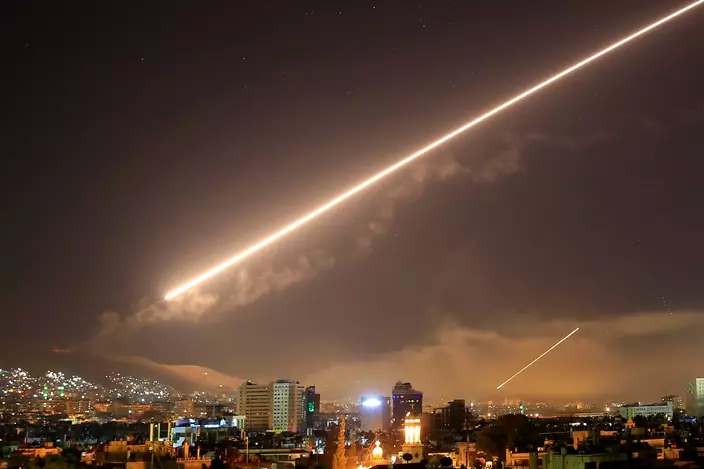
Damascus skies erupt with surface to air missile fire as the U.S. launches an attack on Syria targeting different parts of the Syrian capital Damascus, Syria, early Saturday, April 14, 2018. Syria's capital has been rocked by loud explosions that lit up the sky with heavy smoke as U.S. President Donald Trump announced airstrikes in retaliation for the country's alleged use of chemical weapons. (AP Photo/Hassan Ammar)
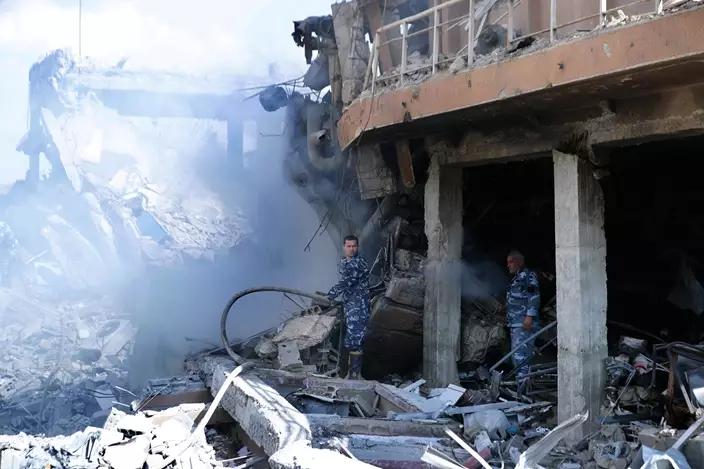
Firefighrers extinguish smoke that rises from the damage of the Syrian Scientific Research Center which was attacked by U.S., British and French military strikes to punish President Bashar Assad for suspected chemical attack against civilians, in Barzeh, near Damascus, Syria, Saturday, April 14, 2018. (AP Photo/Hassan Ammar)
Any opposition expectations that the airstrikes might try to destroy or degrade Assad's lethal air power or target bases where his warplanes and helicopters begin their bombing missions were quickly dashed: The U.S., British and French precision attacks only singled out Assad's alleged chemical weapons capabilities.
The Pentagon said the strikes targeted three facilities — a scientific research center in the Damascus area, allegedly linked to the production and testing of chemical and biological warfare technology; a chemical weapons storage facility west of Homs; and a chemical weapons equipment storage facility and key command post, also west of Homs.
"If this is it, Assad should be relieved," Randa Slim, an expert with the Washington-based Middle East Institute, wrote on Twitter.
For Assad, it was business as usual Saturday — or so his office sought to portray it, posting a short video of him walking into work, briefcase in hand.
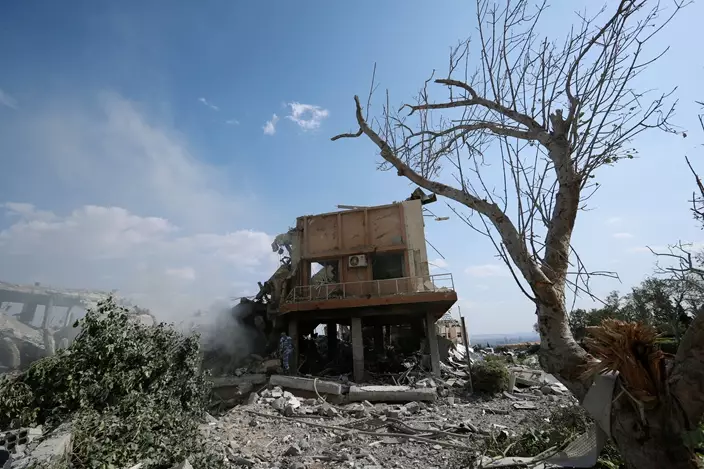
A fireman extinguishes smoke that rises from the damage of the Syrian Scientific Research Center which was attacked by U.S., British and French military strikes to punish President Bashar Assad for suspected chemical attack against civilians, in Barzeh, near Damascus, Syria, Saturday, April 14, 2018. (AP Photo/Hassan Ammar)
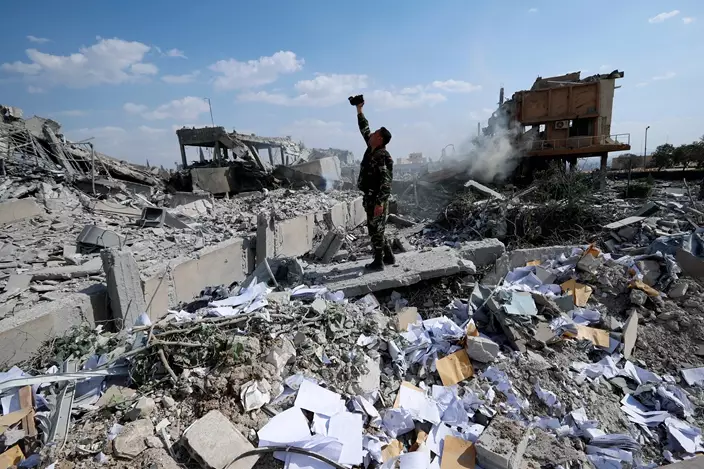
A Syrian soldier films the damage of the Syrian Scientific Research Center which was attacked by U.S., British and French military strikes to punish President Bashar Assad for suspected chemical attack against civilians, in Barzeh, near Damascus, Syria, Saturday, April 14, 2018. (AP Photo/Hassan Ammar)
More pertinently, the Syrian army declared the battered town of Douma "fully liberated" after the last group of rebels left. Douma was the site of the suspected April 7 chemical weapons attack and also the last rebel-held town in the eastern Ghouta region that was once a sprawling rebel-held bastion at the doors of the capital. Thousands of hard-line rebels capitulated in Douma following years of siege and an air and ground campaign that killed hundreds in recent weeks.
The recapture of Douma effectively ends a nearly seven-year rebellion near Damascus and marks Assad's most significant victory since his forces retook the northern city of Aleppo in late 2016. With seemingly open-ended support from allies Russia and Iran, the Syrian military will most definitely turn its attention to remaining opposition-held territory, namely in the south and the northern province of Idlib.
Assad has already consolidated control over most of Syria and its major population centers. His allies have questioned the rationale of a victor needing to resort to chemical weapons that bring global condemnation and risk punitive action.
The seemingly limited airstrikes came as a disappointment to Syria's opposition, with one rebel spokesman labeling them a "farce." Another senior opposition figure, Nasr Hariri, said the attacks were welcome but only reinforced the message that while it is not OK to use chemical weapons, the government can continue to "use explosive barrels and cluster bombs" with impunity.
Assad's chemical weapons capabilities — and exactly what was hit Saturday — remain shrouded in mystery.
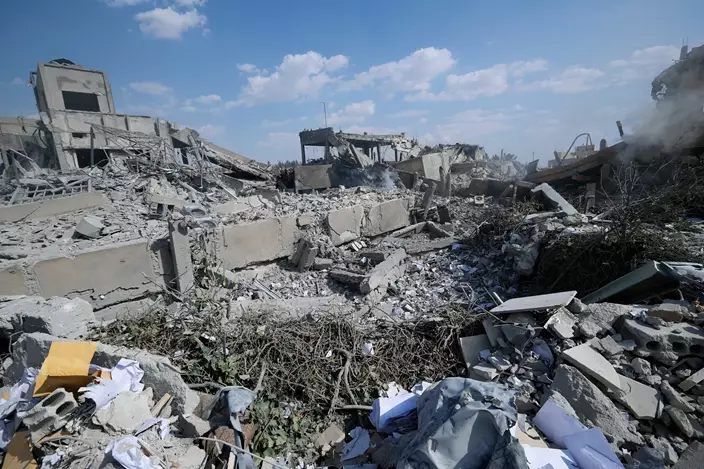
Debris surround the Syrian Scientific Research Center which was attacked by U.S., British and French military strikes to punish President Bashar Assad for suspected chemical attack against civilians, in Barzeh, near Damascus, Syria, Saturday, April 14, 2018.(AP Photo/Hassan Ammar)
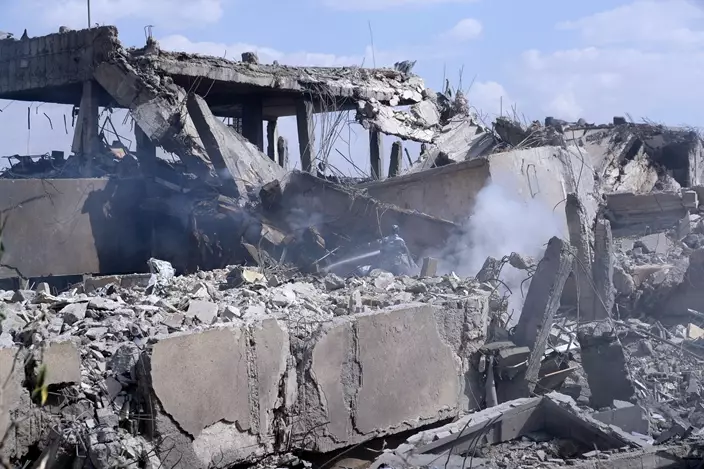
A fireman extinguishes smoke that rises from the damage of the Syrian Scientific Research Center which was attacked by U.S., British and French military strikes to punish President Bashar Assad for suspected chemical attack against civilians, in Barzeh, near Damascus, Syria, Saturday, April 14, 2018. (AP Photo/Hassan Ammar)
Despite Syria's commitment to abolish its program in 2013, U.S. officials say it is "highly likely" that Assad kept a hidden, undisclosed stockpile. They say information gathered from recent alleged attacks also suggest Assad retained a "continued production capacity" — also banned under the 2013 deal.
The government certainly had enough advance notice. Syria war monitors said the military emptied air bases and moved equipment before the strikes.
The Pentagon said Saturday that it believes the airstrikes "attacked the heart of the Syrian chemical weapons program," significantly degrading Syria's ability to use such weapons again. Russian officials said the damage was minimal, maintaining that all key air bases were intact and the purported chemical weapons facilities had been abandoned long ago.
Capt. Adulsalam Abdulrazek, a former officer in Syria's chemical program, said the overnight strikes probably hit "parts of, but not the heart" of the operation.
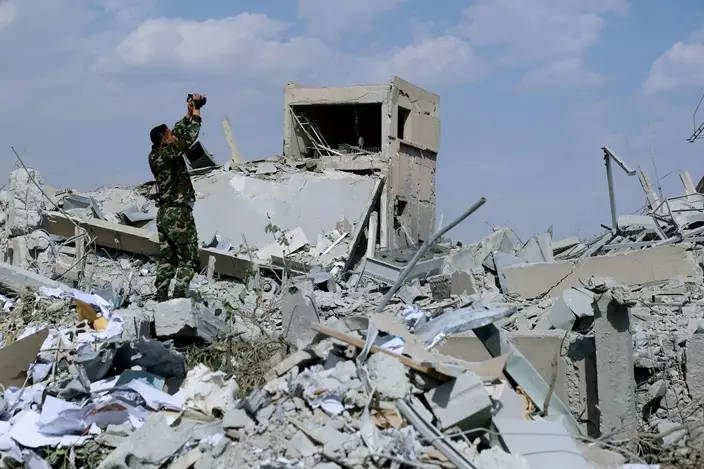
A Syrian soldier films the damage of the Syrian Scientific Research Center which was attacked by U.S., British and French military strikes to punish President Bashar Assad for suspected chemical attack against civilians, in Barzeh, near Damascus, Syria, Saturday, April 14, 2018. (AP Photo/Hassan Ammar)
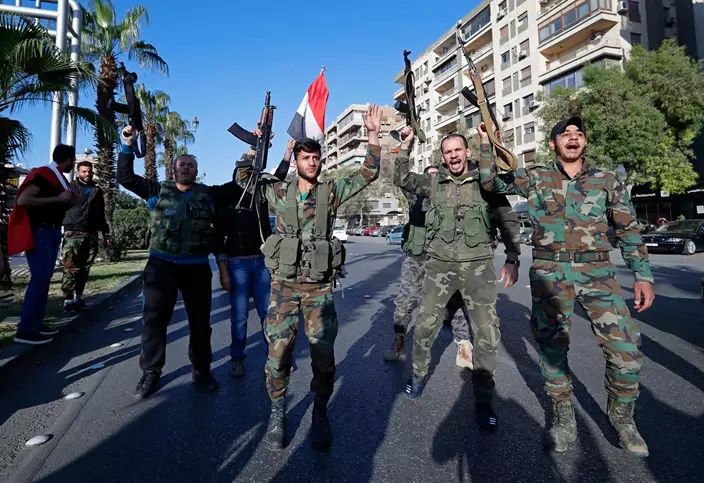
Syrian soldiers hold their weapons as they dance and chant slogans against U.S. President Trump during demonstrations following a wave of U.S., British and French military strikes to punish President Bashar Assad for suspected chemical attack against civilians, in Damascus, Syria, Saturday, April 14, 2018. (AP Photo/Hassan Ammar)
Speaking to The Associated Press from rebel-held northern Syria, he said they were unlikely to curb the government's ability to produce such weapons or launch new attacks.
Abdulrazek defected from the program in 2012, when he was based in eastern Ghouta, the suburb hit by a chemical attack in 2013 and allegedly again on April 7.
He said there were an estimated 50 warehouses storing chemical weapons before the program was dismantled in 2013. He said he believes those fixed storage facilities, mostly in rural areas, are intact or only slightly dispersed, and that the program was only partly dismantled because Damascus didn't allow inspections.
IHS Jane's expert Karl Dewey, said the scientific research facility on the northeastern edge of Damascus is thought to have integrated chemical payloads onto artillery.
It is one of at least three sites that have been consistently referenced in association with Syria's chemical weapons program, including Masyaf and Dummar, also known as Jamraya, both reported to have been hit by Israeli strikes last year.
Whatever the rationale for using chemical weapons, even Assad's most persistent detractors agree he does not need them at this point in the war.
The airstrikes are unlikely to have any real impact on the outcome of the civil war, nor will they serve to bring Assad to the negotiating table to seriously discuss a political settlement, as many hoped.
"Will this deter Assad from using chemical weapons again? Possibly, not least because he's essentially won the war anyway," wrote Faysal Itani, resident senior fellow in the Atlantic Council's Rafik Hariri Center for the Middle East.
"Will it change anything else? For better or worse, no."
Protesters chanted anti-war messages and waved Palestinian flags during the University of Michigan's commencement Saturday, as student demonstrations against the Israel-Hamas war collided with the annual pomp-and-circumstance of graduation season at American universities.
The protest happened at the beginning of the event at Michigan Stadium in Ann Arbor. About 75 people, many wearing traditional Arabic keffiyeh along with their graduation caps, marched up the main aisle toward the graduation stage.
They chanted “Regents, regents, you can’t hide! You are funding genocide!” while holding signs, including one that read: “No universities left in Gaza.”
Overhead, planes flew competing messages. One read: "Divest from Israel now! Free Palestine!” The other read: “We stand with Israel. Jewish lives matter.”
Officials said no one was arrested, and the protest didn’t seriously interrupt the nearly two-hour event, which was attended by tens of thousands of people, some of them waving Israeli flags.
State police prevented the demonstrators from reaching the stage and university spokesperson Colleen Mastony said public safety personnel escorted the protesters to the rear of the stadium, where they remained through the conclusion of the event.
“Peaceful protests like this have taken place at U-M commencement ceremonies for decades,” she added.
U.S. Navy Secretary Carlos Del Toro paused a few times during his remarks, saying at one point, “Ladies and gentlemen, if you can please draw your attention back to the podium."
Before he administered an oath to graduates in the armed forces, Del Toro said they would “protect the freedoms that we so cherish,” including the “right to protest peacefully.”
The university has allowed protesters to set up an encampment on campus but police assisted in breaking up a large gathering at a graduation-related event Friday night, and one person was arrested.
Michigan was among the schools bracing for protests during its commencement ceremonies this weekend, including Indiana University, Ohio State University and Northeastern University in Boston. Many more are slated in the coming weeks.
At Indiana University, protesters were urging supporters to wear their keffiyehs and walk out during remarks by President Pamela Whitten on Saturday evening. The campus in Bloomington, Indiana, has designated a protest zone outside Memorial Stadium, where the ceremony is set to take place.
Tent encampments of protesters calling on universities to stop doing business with Israel or companies they say support the war in Gaza have spread across campuses nationwide in recent weeks in a student movement unlike any other this century. Some schools have reached agreements with the protesters to end the demonstrations and reduce the possibility of disrupting final exams and commencements.
Many encampments have been dismantled and protesters arrested in police crackdowns.
The Associated Press has recorded at least 61 incidents since April 18 where arrests were made at campus protests across the U.S. More than 2,400 people have been arrested on 47 college and university campuses. The figures are based on AP reporting and statements from universities and law enforcement agencies.
At Princeton, in New Jersey, 18 students launched a hunger strike in an effort to push the university to divest from companies tied to Israel.
Senior David Chmielewski, a hunger striker, said in an email Saturday that the latest protest started Friday morning with participants consuming water only.
He said the hunger strike will continue until university administrators meet with students about their demands, which include amnesty from criminal and disciplinary charges for protesters.
Other demonstrators are participating in “solidarity fasts” lasting 24 hours, he said.
Princeton students set up a protest encampment and some held a sit-in at an administrative building this week, leading to about 15 arrests.
Students at other colleges, including Brown and Yale, launched similar hunger strikes earlier this year before the more recent wave of protest encampments.
In other developments Saturday, police broke up a demonstration at the University of Virginia. Campus police called it an “unlawful assembly” in a post on the social platform X.
Footage from WVAW-TV showed police wearing tactical gear removing protesters from an encampment on the Charlottesville campus. Authorities have not said how many people were arrested.
Meanwhile near Boston, students at Tufts University peacefully took down their protest encampment without police intervention Friday night.
Officials with the school in Medford, Massachusetts, said they were pleased with the development, which wasn’t the result of any agreement with protesters. Protest organizers said in a statement that they were “deeply angered and disappointed” that negotiations with the university had failed.
The protests stem from the Israel-Hamas conflict that started on Oct. 7 when Hamas militants attacked southern Israel, killing about 1,200 people, mostly civilians, and taking roughly 250 hostages.
Vowing to destroy Hamas, Israel launched an offensive in Gaza that has killed more than 34,500 Palestinians, around two-thirds of them women and children, according to the Health Ministry in the Hamas-ruled territory. Israeli strikes have devastated the enclave and displaced most of Gaza’s inhabitants.
Marcelo reported from New York. Associated Press reporters Ed White in Detroit; Nick Perry in Boston; and Adrian Sainz in Memphis contributed to this story.
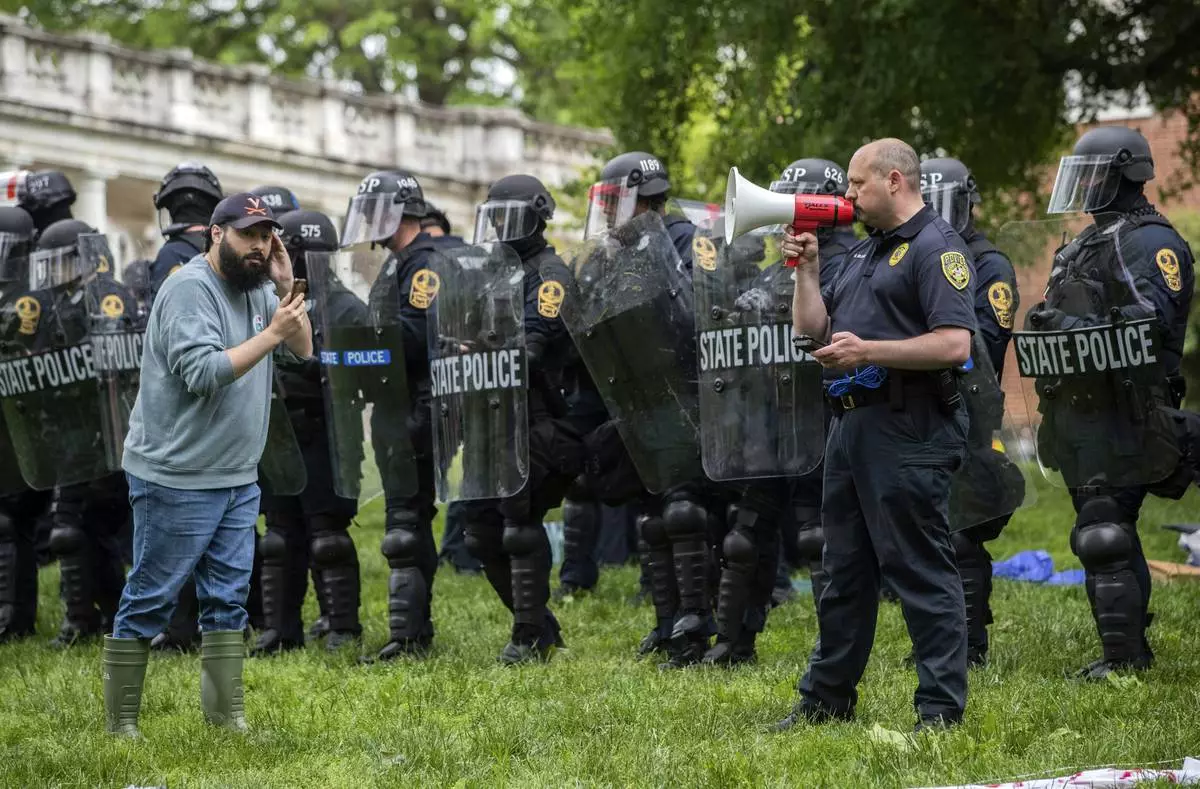
Police use a microphone as a pro-Palestinian demonstrator listens on the grounds of the University of Virginia, in Charlottesville, Va., where tents were set up, Saturday, May 4, 2024. (Cal Cary/The Daily Progress via AP)
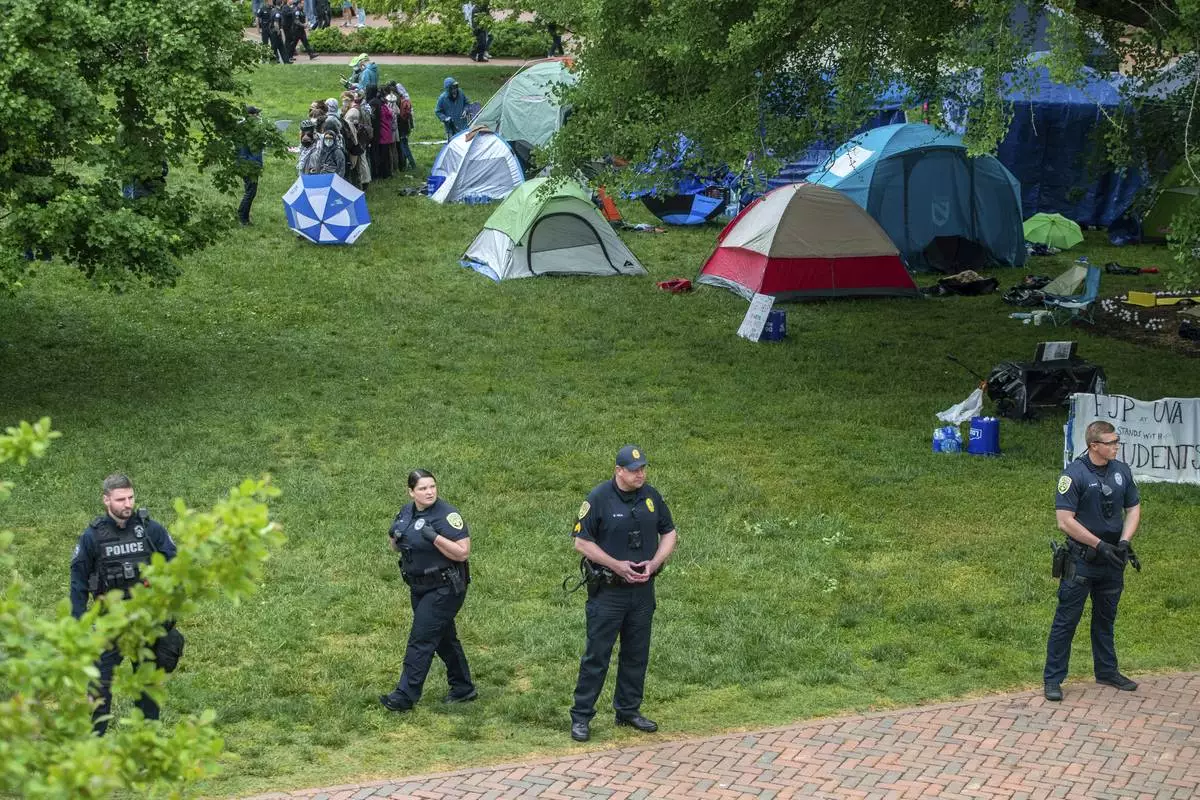
Police form a line where pro-Palestinian protesters set up tents on the grounds of the University of Virginia, in Charlottesville, Va., Saturday, May 4, 2024. (Cal Cary/The Daily Progress via AP)
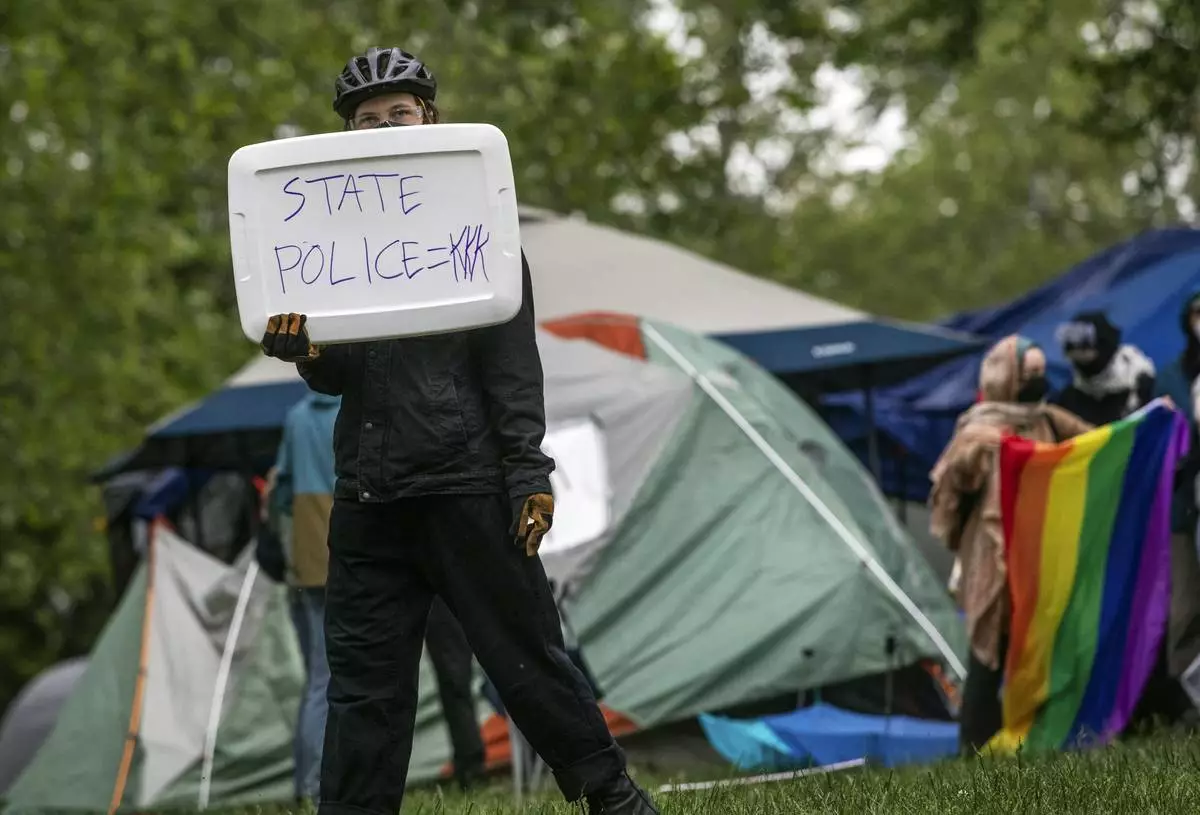
A pro-Palestinian supporter holds a sign reading "State Police=KKK" on the grounds of the University of Virginia, in Charlottesville, Va., where they set up tents, Saturday, May 4, 2024. (Cal Cary/The Daily Progress via AP)
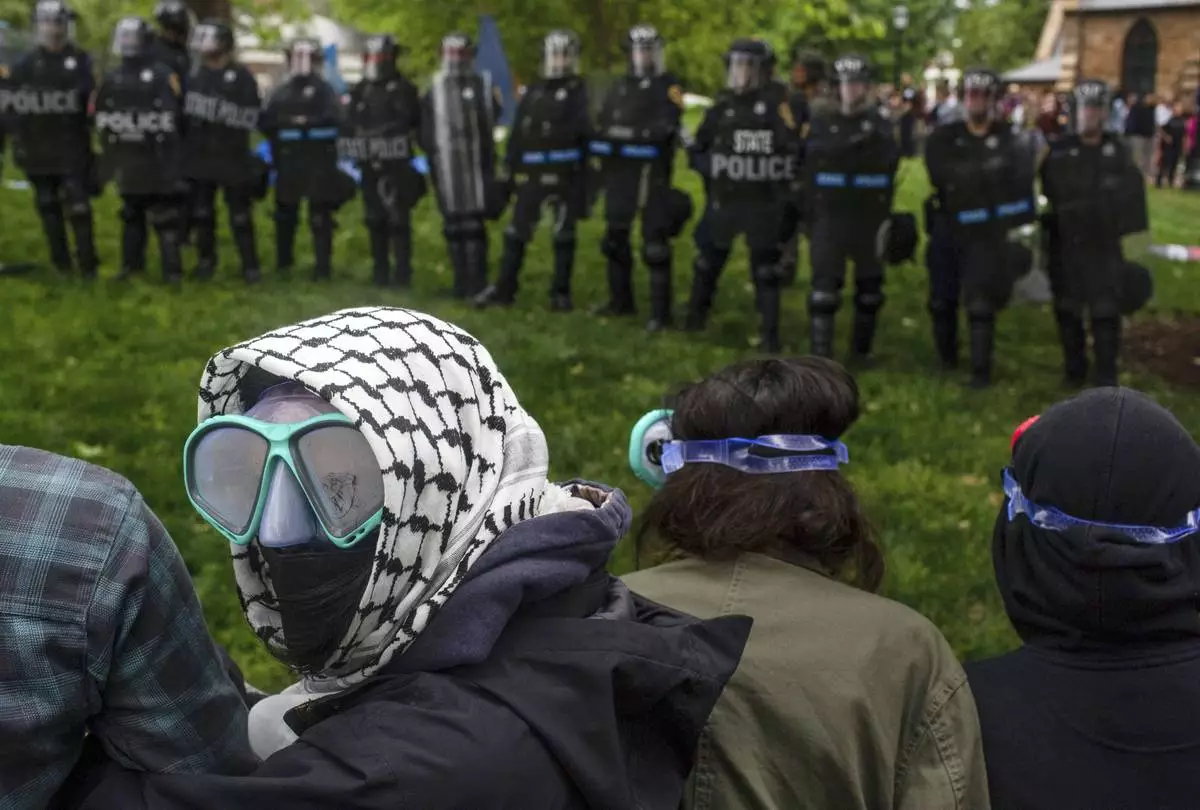
A pro-Palestinian demonstrator wears goggles and a mask as police with riot shields and protesters clash on the grounds of the University of Virginia, in Charlottesville, Va., where tents are set up, Saturday, May 4, 2024. (Cal Cary/The Daily Progress via AP)
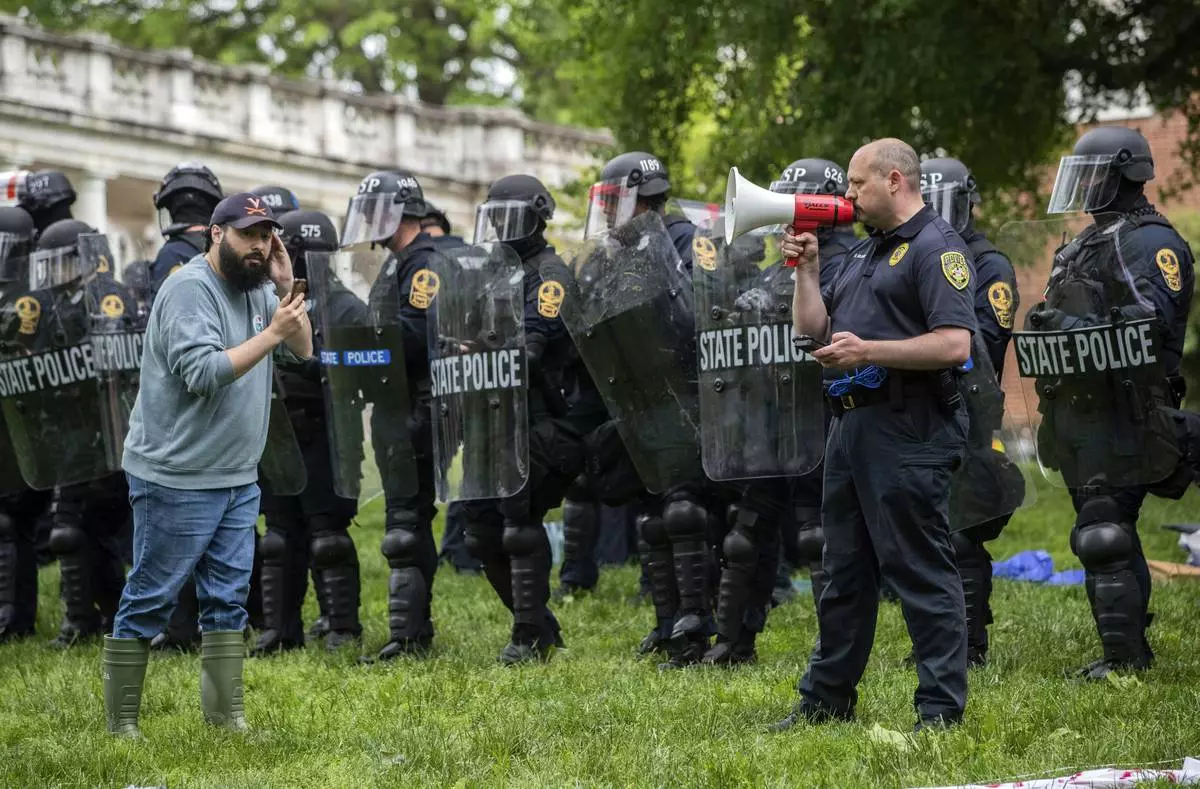
Police use a microphone as a pro-Palestinian protester listens on the grounds of the University of Virginia, in Charlottesville, Va., where tents were set up, Saturday, May 4, 2024. (Cal Cary/The Daily Progress via AP)
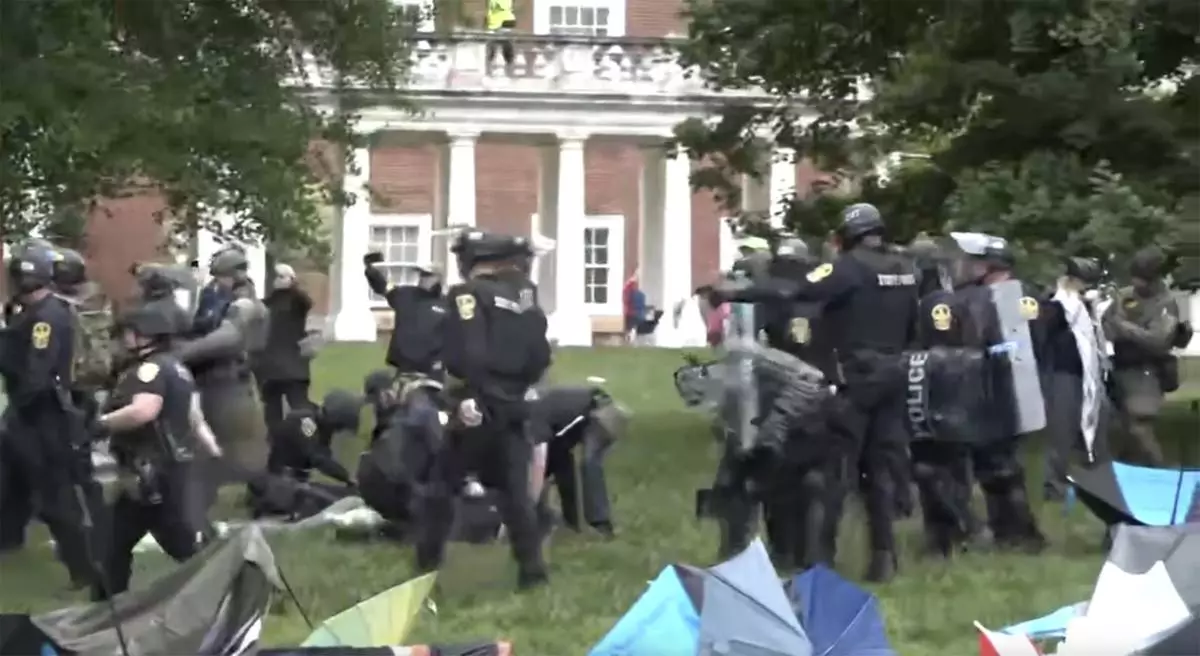
Police take down tents and detain protesters at the University of Virginia on Saturday, May 4, 2024 in Charlottesville, Va. (WVAW via AP)
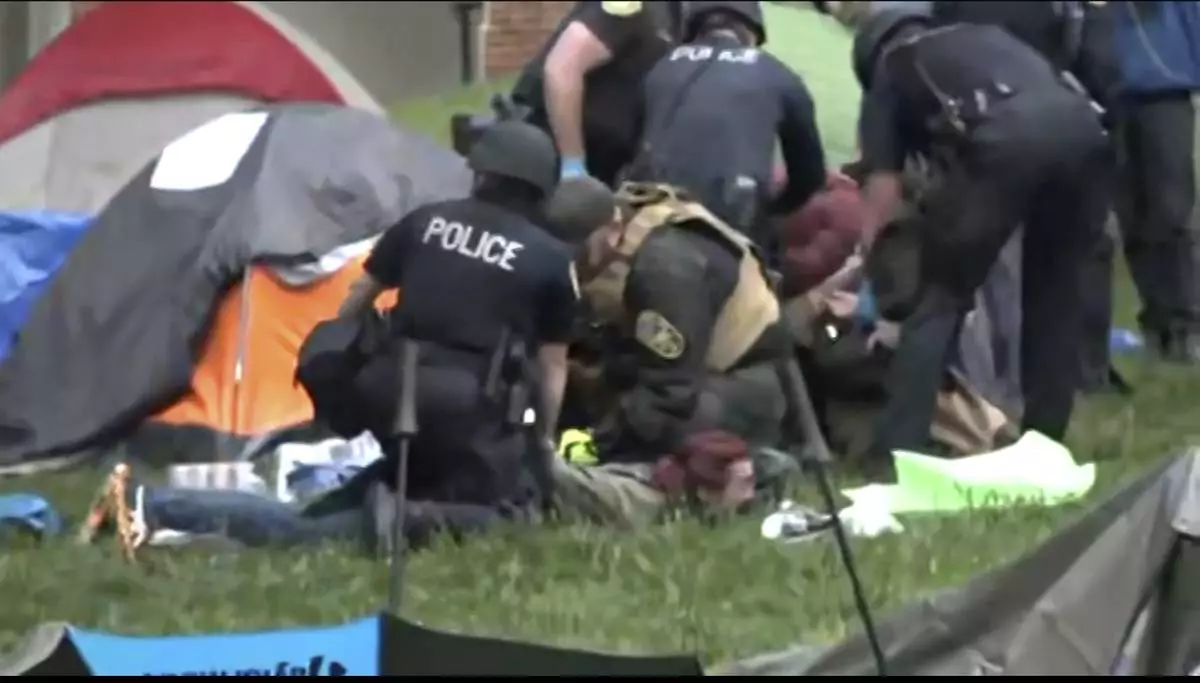
Police take down tents and detain protesters from at the University of Virginia on Saturday, May 4, 2024 in Charlottesville, Va. (WVAW via AP)
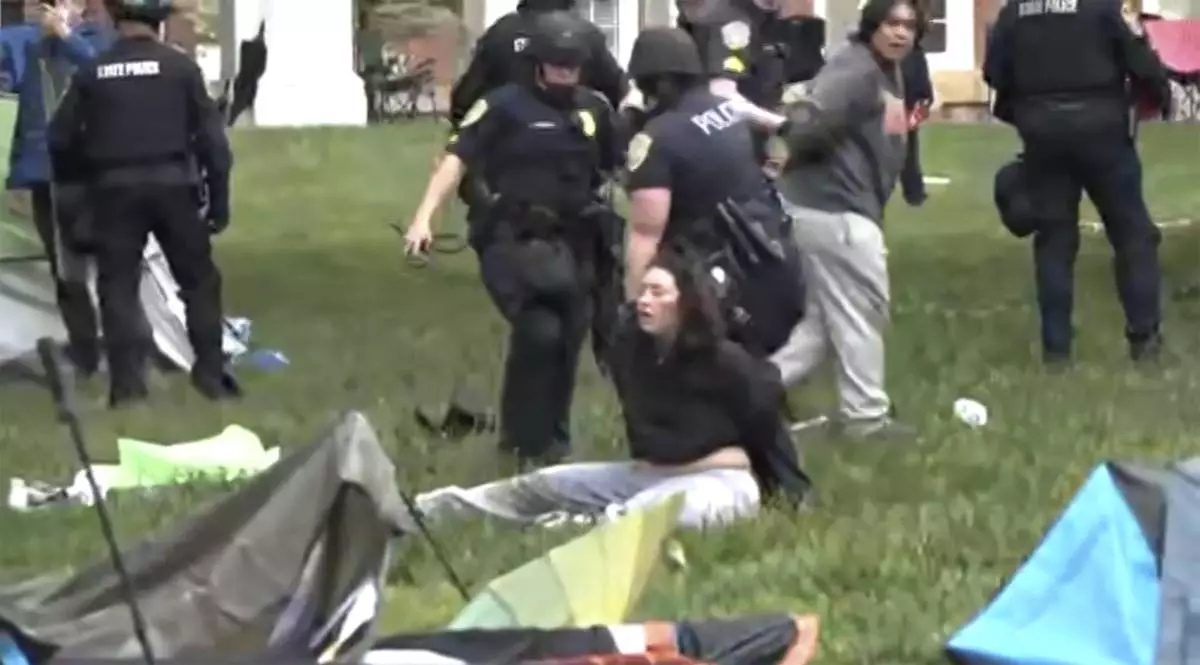
Police detain protesters as they take down tents at the University of Virginia on Saturday, May 4, 2024 in Charlottesville, Va. (WVAW via AP)
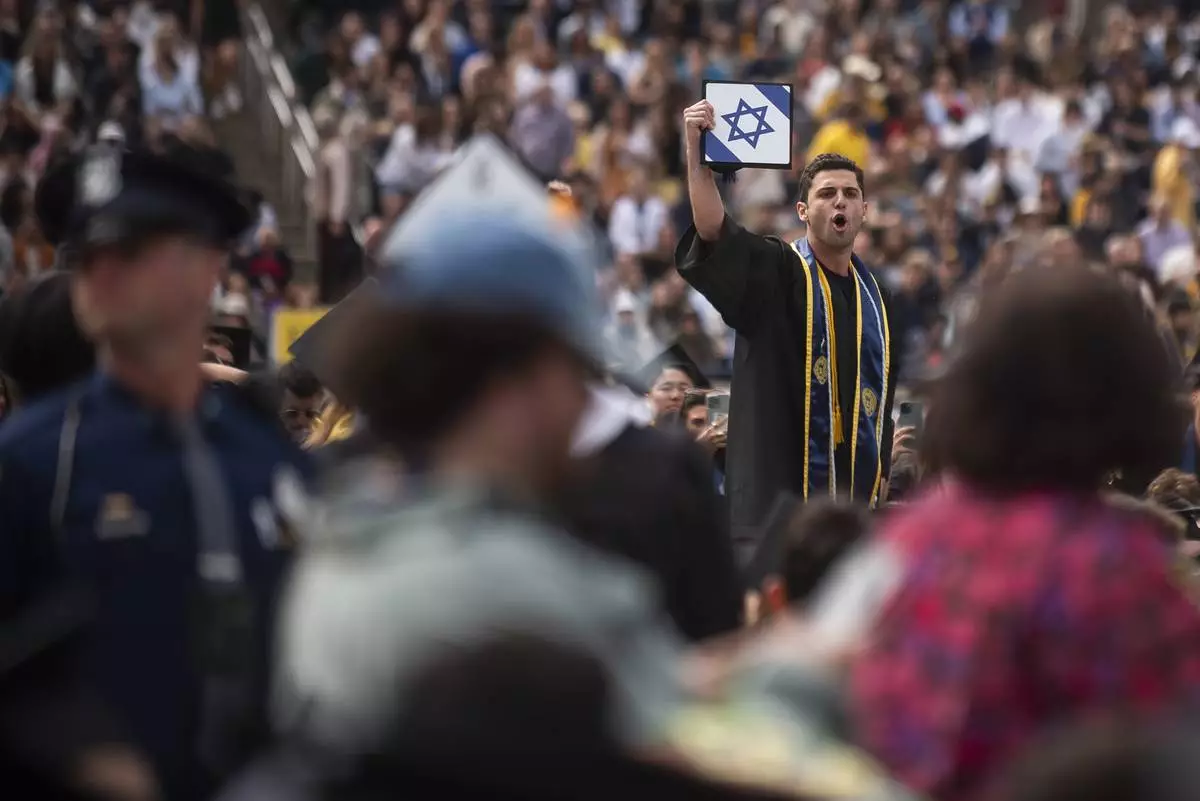
Graduates sporting Israeli flags and pins shout at Pro-Palestinian protesters as they demonstrate during the University of Michigan's Spring 2024 Commencement Ceremony at Michigan Stadium in Ann Arbor, Mich., on Saturday, May 4, 2024. (Katy Kildee/Detroit News via AP)

Rawan Antar, 21, center, chants in support of Palestinians during the University of Michigan's Spring 2024 Commencement Ceremony at Michigan Stadium in Ann Arbor, Mich., on Saturday, May 4, 2024. (Katy Kildee/Detroit News via AP)
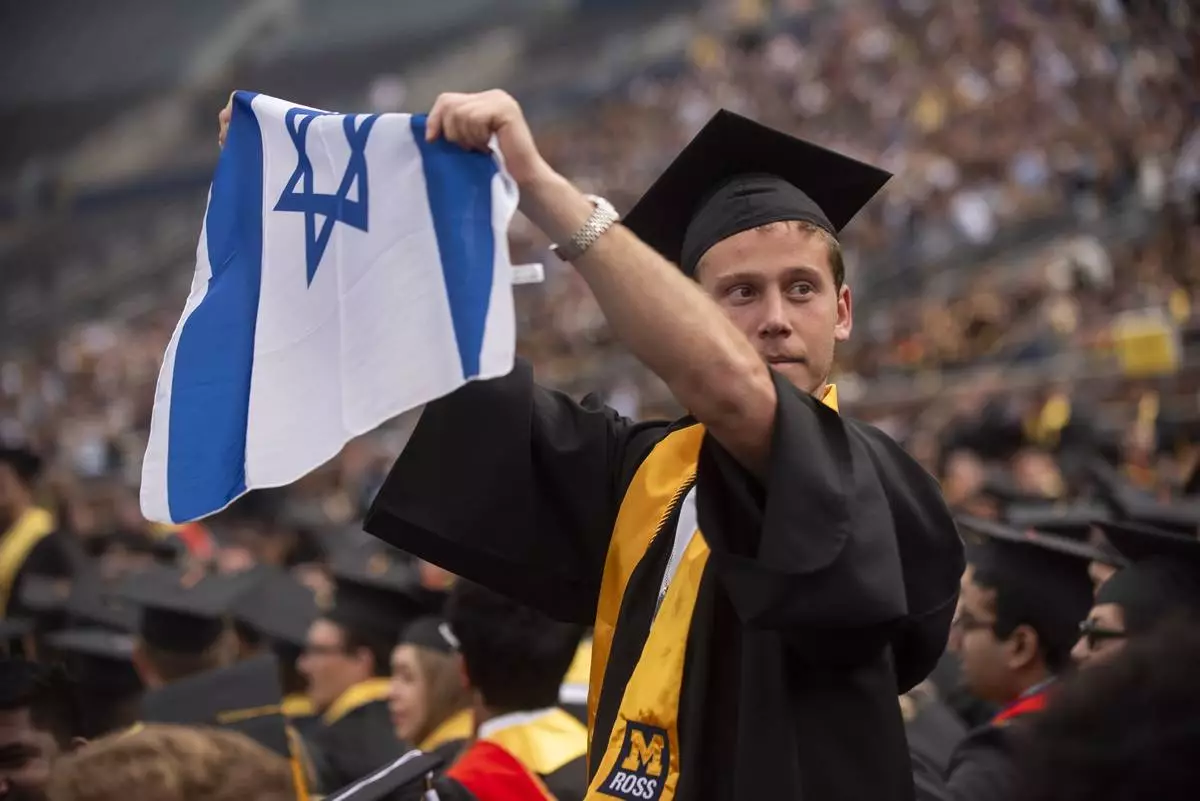
Graduates sporting Israeli flags and pins shout at Pro-Palestinian protesters as they demonstrate during the University of Michigan's Spring 2024 Commencement Ceremony at Michigan Stadium in Ann Arbor, Mich., on Saturday, May 4, 2024. (Katy Kildee/Detroit News via AP)
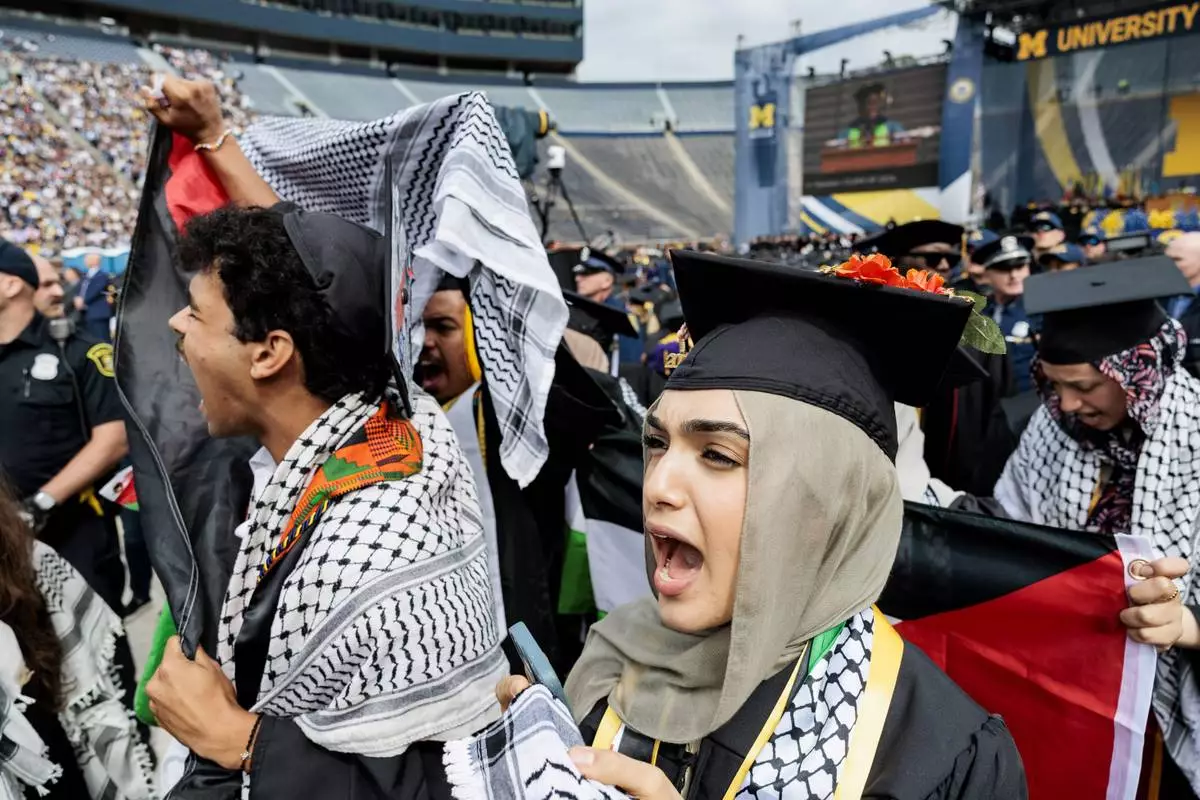
Pro-Palestinian protesters demonstrate during the University of Michigan's Spring 2024 Commencement Ceremony at Michigan Stadium in Ann Arbor, Mich., on Saturday, May 4, 2024.( Jacob Hamilton/Ann Arbor News via AP)
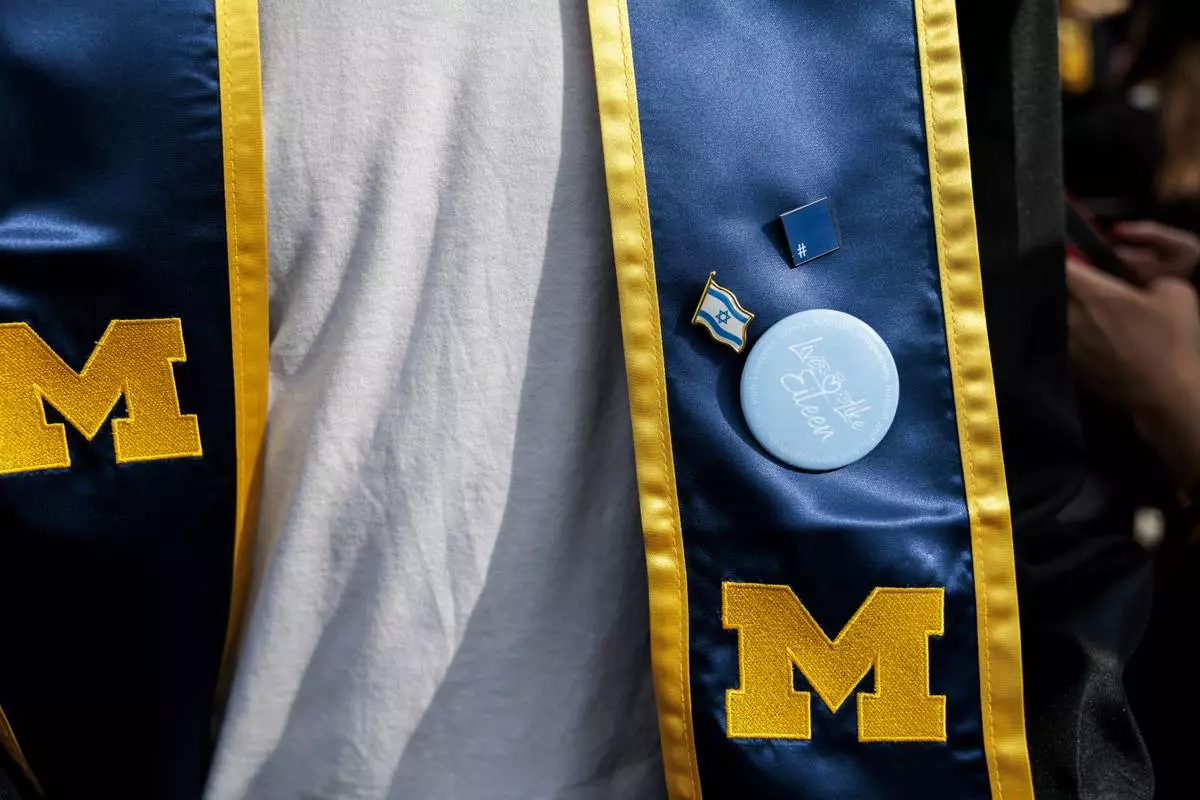
Graduate Ari Belchinsky wears pro-Israel pins during the University of Michigan's Spring 2024 Commencement Ceremony at Michigan Stadium in Ann Arbor, Mich., on Saturday, May 4, 2024. (Jacob Hamilton/Ann Arbor News via AP)

Pro-Palestinian protesters demonstrate during the University of Michigan's Spring 2024 Commencement Ceremony at Michigan Stadium in Ann Arbor, Mich., on Saturday, May 4, 2024.( Jacob Hamilton/Ann Arbor News via AP)
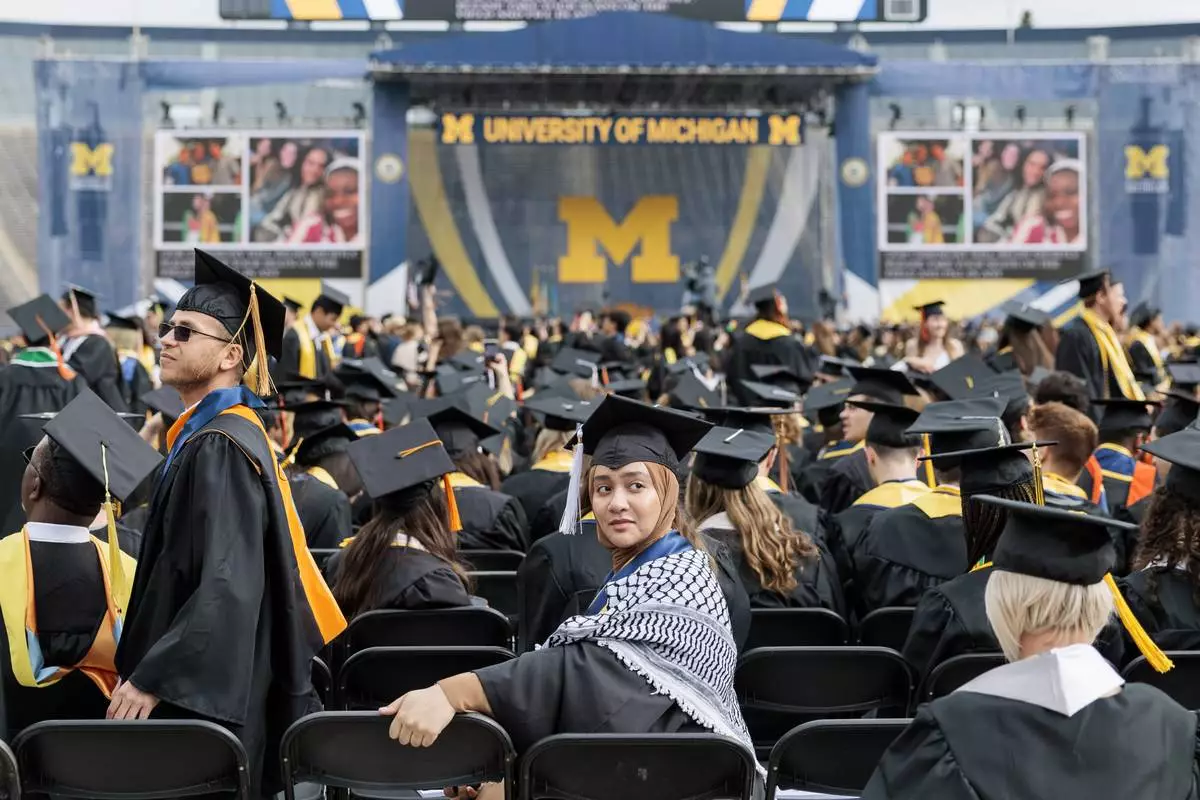
A graduate waits for the University of Michigan's Spring 2024 Commencement Ceremony to begin at Michigan Stadium in Ann Arbor on Saturday, May 4, 2024. (Jacob Hamilton/Ann Arbor News via AP)
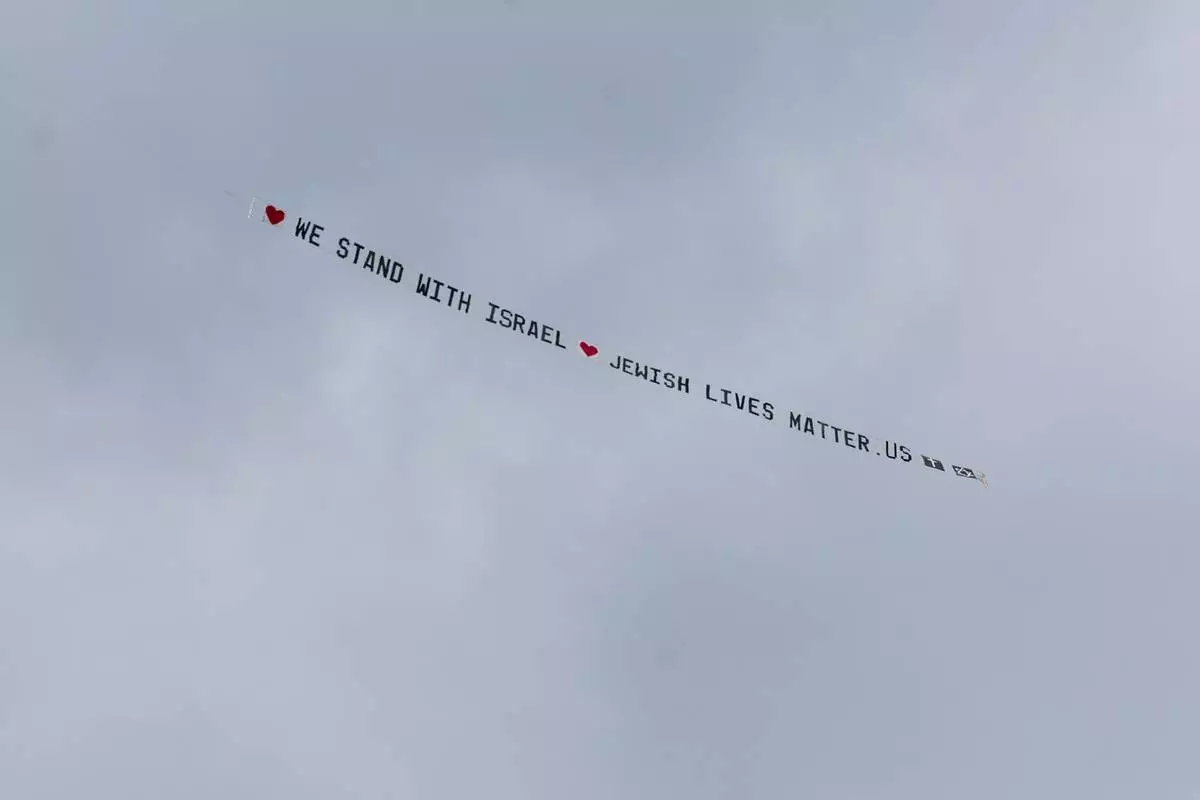
A plane bearing a banner that reads ""We stand with Israel jewishlivesmatter.us" flies overhead before the University of Michigan's Spring 2024 Commencement Ceremony at Michigan Stadium in Ann Arbor, Mich., on Saturday, May 4, 2024. (Jacob Hamilton/Ann Arbor News via AP)
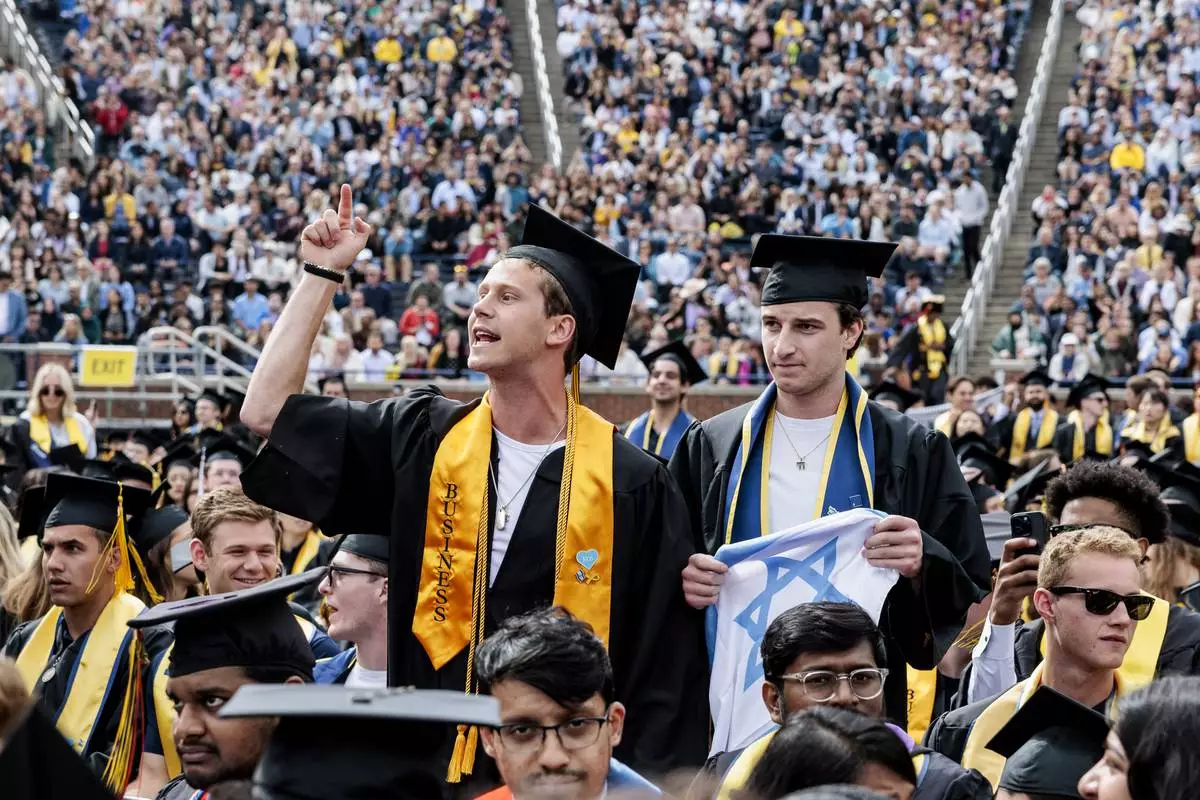
Graduates sporting Israeli flags and pins shout at Pro-Palestinian protesters as they demonstrate during the University of Michigan's Spring 2024 Commencement Ceremony at Michigan Stadium in Ann Arbor, Mich., on Saturday, May 4, 2024.( Jacob Hamilton/Ann Arbor News via AP)
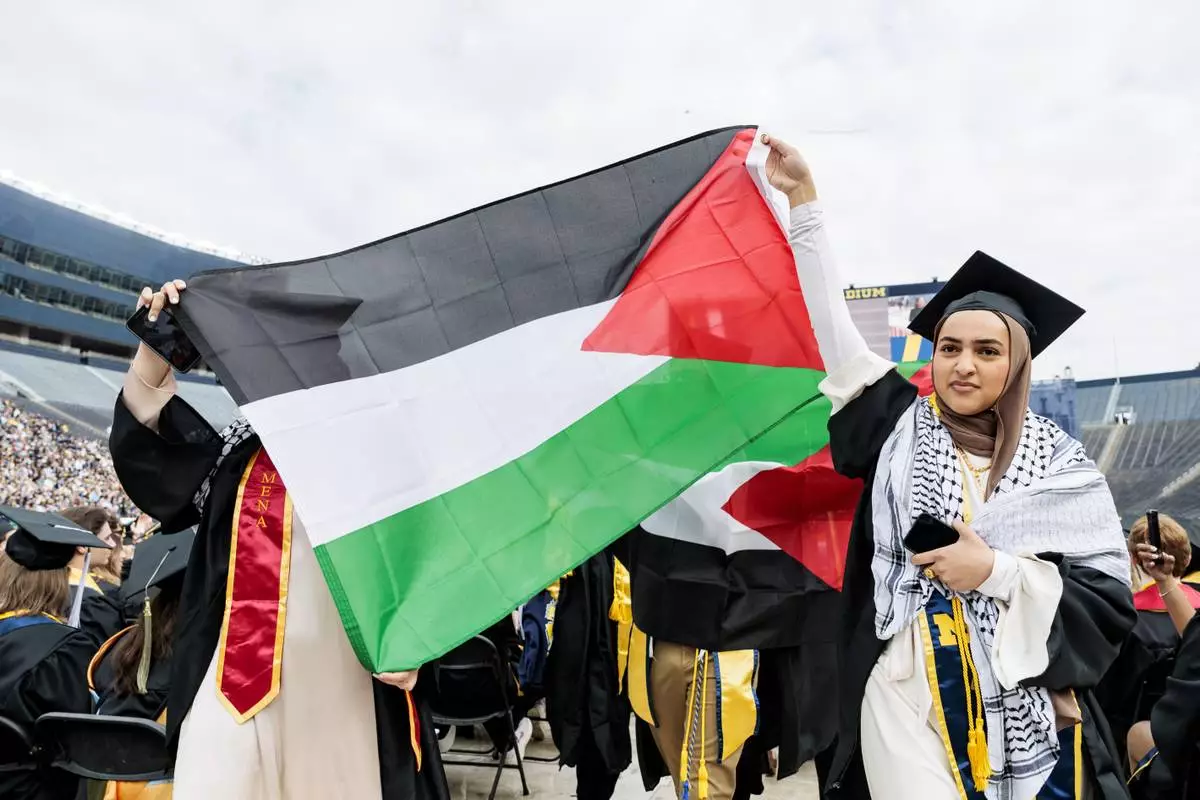
Pro-Palestinian protesters demonstrate during the University of Michigan's Spring 2024 Commencement Ceremony at Michigan Stadium in Ann Arbor, Mich., on Saturday, May 4, 2024.( Jacob Hamilton/Ann Arbor News via AP)






























